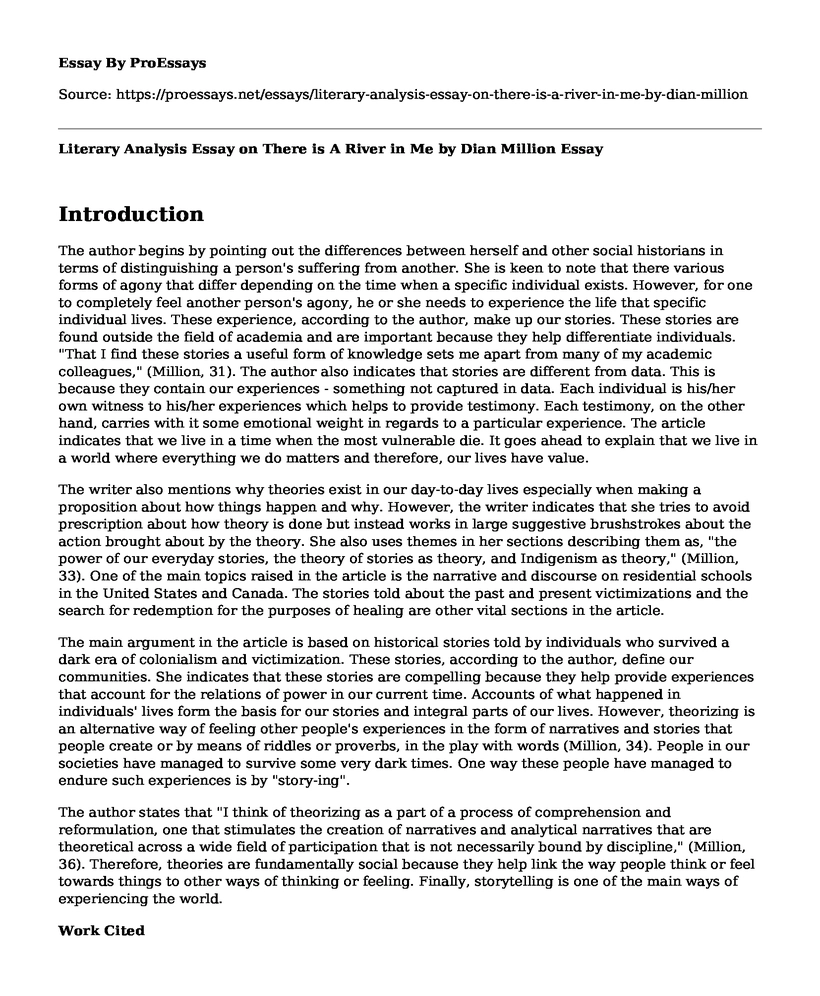Introduction
The author begins by pointing out the differences between herself and other social historians in terms of distinguishing a person's suffering from another. She is keen to note that there various forms of agony that differ depending on the time when a specific individual exists. However, for one to completely feel another person's agony, he or she needs to experience the life that specific individual lives. These experience, according to the author, make up our stories. These stories are found outside the field of academia and are important because they help differentiate individuals. "That I find these stories a useful form of knowledge sets me apart from many of my academic colleagues," (Million, 31). The author also indicates that stories are different from data. This is because they contain our experiences - something not captured in data. Each individual is his/her own witness to his/her experiences which helps to provide testimony. Each testimony, on the other hand, carries with it some emotional weight in regards to a particular experience. The article indicates that we live in a time when the most vulnerable die. It goes ahead to explain that we live in a world where everything we do matters and therefore, our lives have value.
The writer also mentions why theories exist in our day-to-day lives especially when making a proposition about how things happen and why. However, the writer indicates that she tries to avoid prescription about how theory is done but instead works in large suggestive brushstrokes about the action brought about by the theory. She also uses themes in her sections describing them as, "the power of our everyday stories, the theory of stories as theory, and Indigenism as theory," (Million, 33). One of the main topics raised in the article is the narrative and discourse on residential schools in the United States and Canada. The stories told about the past and present victimizations and the search for redemption for the purposes of healing are other vital sections in the article.
The main argument in the article is based on historical stories told by individuals who survived a dark era of colonialism and victimization. These stories, according to the author, define our communities. She indicates that these stories are compelling because they help provide experiences that account for the relations of power in our current time. Accounts of what happened in individuals' lives form the basis for our stories and integral parts of our lives. However, theorizing is an alternative way of feeling other people's experiences in the form of narratives and stories that people create or by means of riddles or proverbs, in the play with words (Million, 34). People in our societies have managed to survive some very dark times. One way these people have managed to endure such experiences is by "story-ing".
The author states that "I think of theorizing as a part of a process of comprehension and reformulation, one that stimulates the creation of narratives and analytical narratives that are theoretical across a wide field of participation that is not necessarily bound by discipline," (Million, 36). Therefore, theories are fundamentally social because they help link the way people think or feel towards things to other ways of thinking or feeling. Finally, storytelling is one of the main ways of experiencing the world.
Work Cited
Million, Dian. "There is a river in me: Theory from life." Theorizing native studies (2014): 31-42.
Cite this page
Literary Analysis Essay on There is A River in Me by Dian Million. (2022, Nov 13). Retrieved from https://proessays.net/essays/literary-analysis-essay-on-there-is-a-river-in-me-by-dian-million
If you are the original author of this essay and no longer wish to have it published on the ProEssays website, please click below to request its removal:
- Literary Analysis Essay on "The Lottery" by Shirley Jackson and "The Destructors" by Graham Greene
- Analysis Essay Sample on 'The Feet of Spring On The Stair' by Rosalia de Castro
- Essay Sample on Oedipus: Blindly Making Decisions Through Pride & Fate
- Essay Example on Comparing Wordsworth and Sidney: Sleep Poems
- The Iliad: Celebrating War and Glory in the Trojan War - Essay Sample
- Essay on Runaway Slave's Journey: Elizabeth Barrett Browning's Abolitionist Poem
- Paper Sample on Journey Over Destination: Lessons from Ithaka







